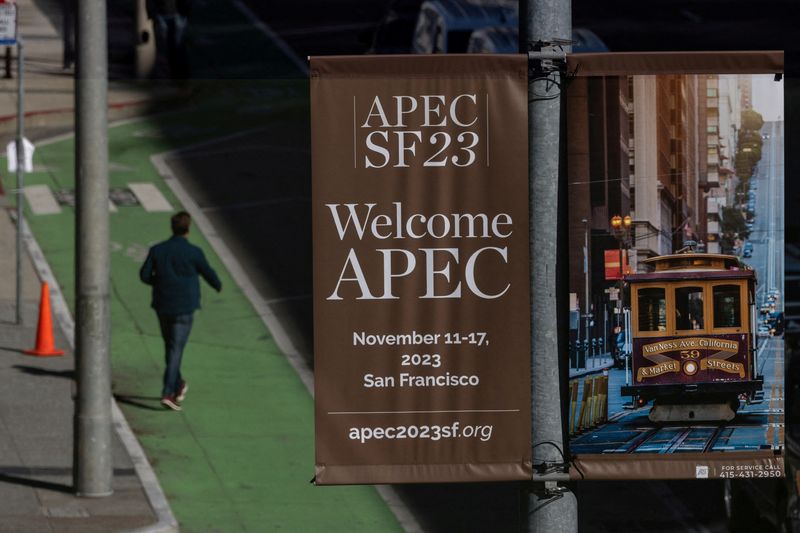By David Lawder
SAN FRANCISCO (Reuters) -The United States is aiming to show that its key Asian economic initiative is making progress as Pacific Rim leaders gather in San Francisco next week, but significant holes remain on trade-related chapters, according to people familiar with the talks.
Negotiators from 14 countries are racing to close out chapters of the Indo-Pacific Economic Framework for Prosperity in hastily arranged talks this week, with announcements expected on cooperation to accelerate the clean energy transition and to fight corruption and tax evasion.
U.S. President Joe Biden is eager to portray IPEF as producing meaningful outcomes to leaders of Asia Pacific Economic Cooperation countries, as he seeks to offer them a U.S.-led alternative to deeper economic ties to China.
When the Biden administration launched the IPEF concept in October 2021, it made clear that the U.S.-hosted APEC summit was a key deadline, "and that has raised expectations," said Wendy Cutler, a former U.S. trade negotiator who now heads the Asia Society Policy Center in Washington.
"The importance of this is to show that the U.S. is stepping up, through APEC and IPEF, to say, 'We're back in Asia and we're going to remain a close economic partner,'" Cutler said.
Former President Donald Trump's administration abandoned the 12-country Trans-Pacific Partnership (TPP) free trade deal in 2017, but IPEF is far more limited in scope, foregoing traditional tariff reductions and other market-access improvements. Instead, it promised cooperation on supply chains and clean energy along with higher standards for labor, environment and regulatory practices and digital trade.
Countries participating in IPEF are Australia, Brunei, Fiji, India, Indonesia, Japan, Malaysia, New Zealand, the Philippines, Singapore, South Korea, Thailand, the United States and Vietnam. All but India and Fiji are also members of APEC.
Only one of the four IPEF "pillars," on strengthening supply chains, has a completed text, with deals reached in May on an early warning system for potential supply disruptions like those experienced after the pandemic, as well as a council to consult on supply chain issues such as those involving national security or critical economic sectors.
People familiar with the talks said that two other pillars led by the Commerce Department are likely to reach substantial conclusion in the next week with announcements on boosting cooperation on de-carbonization efforts and to combat corruption and tax evasion.
DIGITAL SHIFT
The trade pillar has proven more difficult, with many countries not willing to meet U.S. demands to meet certain labor and environmental standards or needing more time to consider them, three people familiar with the talks said.
Negotiations on digital trade standards - once seen as a marquee feature of the IPEF trade pillar - are largely frozen as the Biden administration has suspended discussions on key rules after reversing longstanding U.S. positions on e-commerce.
The U.S. Trade Representative's office last month dropped its insistence on rules to protect free cross-border data flows and to prohibit national requirements for data localization and reviews of software source code, arguing that the change was needed to give Congress room to enact stronger regulations on large technology firms. The move has pleased liberal Democrats who want to rein in Big Tech but angered many business groups.
"It's tough. By adopting these fringe views on digital trade, USTR really brings the main substance on digital trade to a halt," said John Murphy, senior vice president for international policy for the U.S. Chamber of Commerce.
But the Biden administration remains determined to announce some agreements on the trade pillar, with the most likely deals seen in the area of trade facilitation measures, such as adoption of digital customs forms and electronic signature standards.
One of the sources familiar with the talks said that early enthusiasm on the IPEF trade pillar - which excludes India - has given way to frustration over the difficulty and complexity of issues involved.
"Trade negotiations take a long time, even when you're offering market access," said Cutler, who was USTR's lead negotiator on TPP a decade ago. "But when you're not offering market access, the onus is more on the demander - in this case, the United States - to show these other countries that there are benefits."

A group of moderate Democrats on Thursday urged Biden in a letter to strengthen IPEF but go a step further to turn it into a traditional market-opening trade agreement.
The New Democrat Coalition said, "We must pursue a more robust trade agenda in the critically important Indo-Pacific region and urge the Biden administration to finalize a deal that bolsters U.S. global leadership and meaningfully delivers for American workers, farmers and businesses."